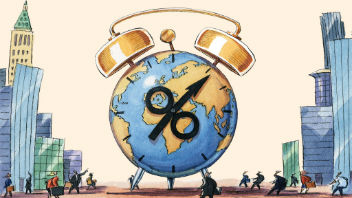
The US Is Holding a Hot Potato
(South Korea) on 18 October 2015
by Gwang-gi Kim (link to original)
The U.S. raising interest rates is a hot topic nowadays. There were initially talks of raising the rates between September and October, then “within the year,” but now it is supposedly premature, leading to forecasts about postponing the rate increase to next year. The confusion only thickens with time. But is it really time for the U.S. Federal Reserve to raise interest rates? Has the American economy become strong enough to be able to raise interest rates? If we only focus on announcements made by the U.S. government, there would be no problem in raising interest rates. The government is pointing to a 5.1 percent unemployment rate — considered to be full employment — and last year’s gross domestic product growth rate of 2.4 percent, which was negative immediately following the financial crisis.
But is it truly the case? First of all, the credibility of the statistics is low. The U.S. was constantly complaining about not being able to trust China’s statistics, but it is now playing the same game. First of all, look at the GDP growth rate. To increase that figure, the U.S. created a new formula for calculating GDP in 2013. What about the unemployment rate? Even though the number of people who have given up seeking employment has grown, that number does not even get counted as a part of the unemployment rate. The truth really comes out when looking at youth unemployment, which is at its worst. Countless graduates from prominent universities are struggling. Those who have decided to start online businesses in their own garages since they could not just sit idly by have become objects of envy. For what it is worth, at least the number of temporary jobs is increasing, but getting one of these jobs is nearly impossible. Even in such times, certain things are rising aggressively: the stock market and real estate. That is due to the government printing money almost without limit. I am talking about quantitative easing. So where would the newly released money go? To overseas vulture funds, or to the domestic real estate and stock markets.* We cannot, therefore, really consider the boom in those sectors as a true barometer of economic recovery. If it is a true economic recovery, the lives of common folk, those of the middle class and below, should be getting better. You cannot call it an economic recovery when only an extremely small number of wealthy people are striking gold.
Some facts directly prove this. First, it is truly odd that the number of homeless public school students is increasing despite the government announcement that the economy has gotten better. Last year, the number of homeless students attending public school was 1.36 million, almost twice the number before the financial crisis. At the end of September, the city of Los Angeles declared a state of emergency due to the rapidly increasing number of homeless people. While an extremely small number of wealthy people and large-scale investment companies are hoarding homes and real estate, and acquiring even greater wealth in the stock market using the newly released money, the lives of regular people are becoming even more impoverished. The stock market is sometimes an inverse of the real economy. The current situation in the U.S. is a perfect example. As we all know, the U.S. stock market hit bottom in March 2009, and prior to the recent Chinese stock market crash, it has been on an upward trend for almost six years. It is all due to quantitative easing. The U.S. stock market entered correction as an aftermath of the Chinese stock market crash — but following the recent news that the real economy is not doing well, it has actually gone up again instead of going further down. This strange phenomenon is caused by the anticipation that the real economy doing poorly will prevent the raising of interest rates, and possibly lead to additional quantitative easing.
The administration is boasting that it has saved the economy from crisis via quantitative easing, ultra-low interest rates, and simple number fixing. Meanwhile, it is trying with all its might to control the large asset bubble by raising interest rates, but the current situation in the U.S. makes that choice extremely difficult. The reason is that economic recovery, a precondition for raising interest rates, has made very little progress. In other words, the U.S. is holding a hot potato, where it can neither raise nor keep interest rates the same. So the Fed is driving the market deeper into chaos with its ambiguous and duplicitous play. In the meantime, the polarization of wealth is getting worse. Citizens worldwide are facing an unprecedented fate, in which they will be robbed of all their property like sacrificial lambs. As if to drive home the point, I recently heard the bitter news that Haeundae Beach now has a 6.8 billion won ($5.8 million) apartment for sale.**
*Editor’s note: A vulture fund is a hedge fund or private equity fund that invests in debt considered to be very weak or in imminent default., known as distressed securities.
**Editor's note: Haeundae Beach is a popular and affluent beach community in South Korea.
